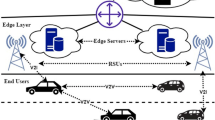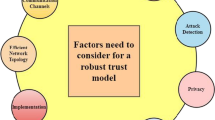Abstract
The emerging yet promising paradigm of Internet-of-Vehicles (IoV) has received considerable attention in the recent years as an integral and indispensable constituent of the modern intelligent transportation systems, wherein safety-critical information is exchanged amongst the connected vehicles via a high-bandwidth, low-latent vehicle-to-everything communication system so as to ensure road safety and highly efficient traffic flows. Therefore, it is of utmost importance to ensure the authenticity and reliability of such safety messages together with the legitimacy of the vehicles disseminating the same. This necessitates instituting a state-of-the-art trust-based mechanism in order to not only identify but to further evict the malicious vehicles from an IoV network. The risk augments if a malicious vehicle (via its malign attempts) assume the role of a cluster head in a cluster, thereby jeopardizing the safety of both the occupants of the vehicles and vulnerable pedestrians. Hence, intelligent algorithms with a potential to opt for both a trusted and a resource efficient cluster head needs to be put into place to guarantee the overall security and resource efficacy of the corresponding cluster. Accordingly, in this paper, we have envisaged a scalable hybrid trust-based model which introduces a composite metric encompassing the weighted amalgamation of a vehicle’s computed trust score and its corresponding available resources in order to ensure that the stringent performance requirements of the safety-critical vehicular applications are fully met. A Hungarian algorithm-based role assignment mechanism has been subsequently envisaged for the selection of an optimal cluster head, proxy cluster head, and followers amongst the members of a vehicular cluster for maximizing its overall efficacy. Furthermore, the notion of an adaptive threshold has been proposed in order to identify and subsequently eliminate the smart malicious vehicles from an IoV network in a timely manner, i.e., as soon as they start exhibiting an adverse behavior, to guarantee that the network is not manipulated for any malicious gains. Extensive simulations have been carried out and performance analysis demonstrates the efficaciousness of our proposed scheme.






Similar content being viewed by others
Explore related subjects
Discover the latest articles, news and stories from top researchers in related subjects.References
Alnasser A, Sun H, Jiang J (2020) Recommendation-based trust model for vehicle-to-everything (V2X). IEEE Internet Things J 7(1):440–450
Ahmad F, Franqueira VNL, Adnane A (2018) TEAM: a trust evaluation and management framework in context-enabled vehicular Ad Hoc networks. IEEE Access 6:28643–28660
Ahmad F, Kurugollu F, Kerrache CA, Sezer S, Liu L (2021) NOTRINO: a novel hybrid trust management scheme for internet-of-vehicles. IEEE Trans Veh Technol
Hussain R, Lee J, Zeadally S (2020) Trust in VANET: a survey of current solutions and future research opportunities. IEEE Trans IntellTransp Syst 22(5):2553–2571
Sheehan B, Murphy F, Mullins M, Ryan C (2019) Connected & autonomous vehicles: a cyber-risk classification framework. Transp Res Part A Polic Pract 124:523–536
Sharma S, Kaushik B (2019) A survey on internet of vehicles: applications, security issues & solutions. Veh Commun 20:100182
Aloqaily M, Otoum S, Ridhawi IA, Jararweh Y (2019) An intrusion detection system for connected vehicles in smart cities. Ad Hoc Netw 90:101842
Awan KA, Din IU, Almogren A, Guizani M, Khan S (2020) StabTrust - a stable and centralized trust-based clustering mechanism for IoT enabled vehicular Ad Hoc networks. IEEE Access 8:21159–21177
Kchaou A, Abassi R, Guemara S (2020) Towards the performance evaluation of a clustering and trust based security mechanism for VANET. In: Volkamer M, Wressnegger C (eds) Proceedings of the 15th International Conference on Availability, Reliability, and Security (ARES’20), ACM, New York, USA, 52:1–6
Kchaou A, Abassi R, Fatmi SGE (2018) Towards a secured clustering mechanism for messages exchange in VANET. In: Barolli et al. (eds) Proceedings of the 32nd International Conference on Advanced Information Networking and Applications Workshops (WAINA), Krakow, Poland, pp. 88-93
Oubabas S, Aoudjit R, Rodrigues JJPC, Talbi S (2018) Secure and stable vehicular Ad Hoc network clustering algorithm based on hybrid mobility similarities and trust management scheme. Veh Commun 13:128–138
Abassi R, Douss ABC, Sauveron D (2020) TSME: a trust-based security scheme for message exchange in vehicular Ad hoc networks. Hum-Centric Comput Inf Sci 10(1):1–19
Sugumar R, Rengarajan A, Jayakumar C (2018) Trust-based authentication technique for cluster based vehicular Ad hoc networks (VANET). Wirel Netw 24:373–382
Sheikh MS, Liang J, Wang W (2019) A survey of security services, attacks, and applications for vehicular Ad Hoc networks (VANETs). Sensors 19(16):3589
Rai IA, Shaikh RA, Hassan SR (2020) A hybrid dual mode trust management scheme for vehicular networks. Int J Distrib Sens Netw 16(7):1550147720939372
Mahmood A, Butler B, Zhang WE, Sheng QZ, Siddiqui SA (2019) A hybrid trust management heuristic for VANETs. In: IEEE International Conference on Pervasive Computing and Communications Workshops (PerCom Workshops). Kyoto, Japan, pp 748–752
Rehman G-U, Ghani A, Zubair M, Naqvi SHA, Singh D, Muhammad S (2019) IPS: incentive and punishment scheme for omitting selfishness in the internet of vehicles (IoV). IEEE Access 7:109026–109037
Rehman G-U, Ghani A, Muhammad S, Singh M, Singh D (2020) Selfishness in vehicular delay-tolerant networks: a review. Sensors 20(10):3000
Bagga P, Das AK, Wazid M, Rodrigues JJPC, Park Y (2020) Authentication protocols in internet of vehicles: taxonomy, analysis, and challenges. IEEE Access 8:54314–54344
Kerrache CA, Calafate CT, Cano J, Lagraa N, Manzoni P (2016) Trust management for vehicular networks: an adversary-oriented overview. IEEE Access 4:9293–9307
Mollah MB, Zhao J, Niyato D, Guan YL, Yuen C, Sun S, Lam K-Y, Koh LH (2021) Blockchain for the internet of vehicles towards intelligent transportation systems: a survey. IEEE Internet Things J 8(6):4157–4185
Sharma V (2019) An energy-efficient transaction model for the blockchain-enabled internet of vehicles (IoV). IEEE Commun Lett 23(2):246–249
Wang C, Cheng X, Li J, He Y, Xiao K (2021) A survey: applications of blockchain in the internet of vehicles. EURASIP J Wirel Commun Netw 77:1–16
Siddiqui SA, Mahmood A, Sheng QZ, Suzuki H, Ni W (2021) A survey of trust management in the internet of vehicles. Electronics 10(18):2223
Ahmad F, Adnane A, Kerrache CA, Kurugollu F, Phillips I (2019) On the design, development and implementation of trust evaluation mechanism in vehicular networks. In: IEEE/ACS 16th International Conference on Computer Systems and Applications (AICCSA). Abu Dhabi, United Arab Emirates, pp.1–7
Zhang J, Zheng K, Zhang D, Yan B (2020) AATMS: an anti-attack trust management scheme in VANET. IEEE Access 8:21077–21090
Chen J-M, Li T-T, Panneerselvam J (2019) TMEC: a trust management based on evidence combination on attack-resistant and collaborative internet of vehicles. IEEE Access 7:148913–148922
Hasrouny H, Samhat AE, Bassil C, Laouiti A (2018) Trust model for secure group leader-based communications in VANET. Wirel Netw 25:4639–4661
Huang X, Yu R, Kang J, Zhang Y (2017) Distributed reputation management for secure and efficient vehicular edge computing and networks. IEEE Access 5:25408–25420
Liu Y, Li K, Jin Y, Zhang Y, Qu W (2011) A novel reputation computation model based on subjective logic for mobile Ad hoc networks. Future Gener Comput Syst 27(5):547–554
Qureshi KN, Idrees MM, Lloret J, Bosch I (2020) Self-assessment based clustering data dissemination for sparse and dense traffic conditions for internet of vehicles. IEEE Access 8:10363–10372
Dutta AK, Elhoseny M, Dahiya V, Shankar K (2020) An efficient hierarchical clustering protocol for multihop internet of vehicles communication. Trans Emerg Telecommun Technol 31(5):e3690
Li L, Wang W, Gao Z (2020) Driver’s social relationship based clustering and transmission in vehicle Ad Hoc networks (VANETs). Electronics 9(2):298
Huo Y, Liu Y, Ma L, Cheng X, Jing T (2016) An enhanced low overhead and stable clustering scheme for crossroads in VANETs. EURASIP J Wirel Commun Netw 2016(1):1–13
Acknowledgements
The corresponding author sincerely acknowledges the generous support of the Government of the Commonwealth of Australia and Macquarie University, Sydney, Australia for funding this research work via its International Research Training Program (Allocation No. 2017560) and a Postdoctoral Research Fellowship.
Author information
Authors and Affiliations
Corresponding author
Additional information
Publisher's Note
Springer Nature remains neutral with regard to jurisdictional claims in published maps and institutional affiliations.
Rights and permissions
About this article
Cite this article
Mahmood, A., Siddiqui, S.A., Sheng, Q.Z. et al. Trust on wheels: Towards secure and resource efficient IoV networks. Computing 104, 1337–1358 (2022). https://doi.org/10.1007/s00607-021-01040-7
Received:
Accepted:
Published:
Issue Date:
DOI: https://doi.org/10.1007/s00607-021-01040-7
Keywords
- Internet-of-Vehicles
- Network security
- Trust management
- Misbehaviour identification
- Network resource management




